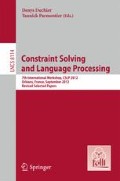Abstract
We present in this paper a technique aiming at enriching existing treebanks with constraint-based information. The technique consists in acquiring a constraint grammar from the original constituency treebank and applying it with a constraint parser to the source treebank. The result is an hybrid treebank, with both constituency and constraint-based representations. After a presentation of the general technique in the framework of Property Grammars, we propose an application for the hybridization of the French Treebank. This kind of resource offers several interests, including the possibility of identifying the relative importance of constraints. We present a method assigning weights to individual constraints as well as constraint types. An experiment by means of human acceptability judgments gives a first validation of the approach.
Access this chapter
Tax calculation will be finalised at checkout
Purchases are for personal use only
Preview
Unable to display preview. Download preview PDF.
References
Oepen, S., Flickinger, D., Toutanova, K., Manning, C.D.: Lingo redwoods: A rich and dynamic treebank for hpsg. Research on Language and Computation 2, 575–596 (2004)
Prince, A., Smolensky, P.: Optimality Theory: Constraint Interaction in Generatire Grammar. Technical report, TR-2, Rutgers University Cognitive Science Center, New Brunswick, NJ (1993)
Blache, P.: Les Grammaires de Propriétés: Des contraintes pour le traitement automatique des langues naturelles. Hermès (2001)
Smolensky, P., Legendre, G.: The Harmonic Mind From Neural Computation to Optimality-Theoretic Grammar. MIT Press (2006)
Foth, K., Menzel, W., Schröder, I.: Robust Parsing with Weighted Constraints. Natural Language Engineering 11, 1–25 (2005)
Schröder, I., Pop, H.F., Menzel, W., Foth, K.A.: Learning weights for a natural language grammar using genetic algorithms. In: Giannakoglou, K., Tsahalis, D., Periaux, J., Papailiou, K., Fogarty, T. (eds.) Evolutionary Methods for Design, Optimisation and Control (2002)
Sorace, A., Keller, F.: Gradience in linguistic data. Lingua 115, 1497–1524 (2005)
Blache, P., Hemforth, B., Rauzy, S.: Acceptability prediction by means of grammaticality quantification. In: ACL- 44: Proceedings of the 21st International Conference on Computational Linguistics and the 44th Annual Meeting of the Association for Computational Linguistics. Association for Computational Linguistics (2006)
Blache, P.: Evaluating language complexity in context: New parameters for a constraint-based model. In: CSLP 2011: Workshop on Constraint Solving and Language Processing (2011)
Duchier, D., Prost, J.-P., Dao, T.-B.-H.: A model-theoretic framework for grammaticality judgements. In: de Groote, P., Egg, M., Kallmeyer, L. (eds.) FG 2009. LNCS, vol. 5591, pp. 17–30. Springer, Heidelberg (2011)
Bies, A., Ferguson, M., Katz, K., MacIntyre, R.: Bracketing guidelines for treebank ii style. Department of Computer and Information Science. University of Pennsylvania (1995)
Abeillé, A., Clément, L., Toussenel, F.: Building a treebank for french. In: Abeillé, A. (ed.) Treebanks, Kluwer, Dordrecht (2003)
Telljohann, H., Hinrichs, H., S., K.: The tüba-d/z treebank - annotating german with a context-free backbone. In: 4th International Conference on Language Resources and Evaluation (2004)
Böhmová, A., Hajič, J., Hajičová, E., Vidová-Hladká, B.: The prague dependency treebank: A three-level annotation scenario. In: Abeillé, A. (ed.) Treebanks: Building and Using Parsed Corpora, pp. 103–127. Kluwer (2003)
Lin, D.: A dependency-based method for evaluating broad-coverage parsers. Natural Language Engineering 4, 97–114 (1998)
Gazdar, G., Klein, E., G., P., Sag, I.: The Logic of Typed Feature Structures. Blackwell (1985)
Author information
Authors and Affiliations
Editor information
Editors and Affiliations
Rights and permissions
Copyright information
© 2013 Springer-Verlag Berlin Heidelberg
About this paper
Cite this paper
Blache, P. (2013). Building and Exploiting Constraint-Based Treebanks. In: Duchier, D., Parmentier, Y. (eds) Constraint Solving and Language Processing. CSLP 2012. Lecture Notes in Computer Science, vol 8114. Springer, Berlin, Heidelberg. https://doi.org/10.1007/978-3-642-41578-4_2
Download citation
DOI: https://doi.org/10.1007/978-3-642-41578-4_2
Publisher Name: Springer, Berlin, Heidelberg
Print ISBN: 978-3-642-41577-7
Online ISBN: 978-3-642-41578-4
eBook Packages: Computer ScienceComputer Science (R0)

